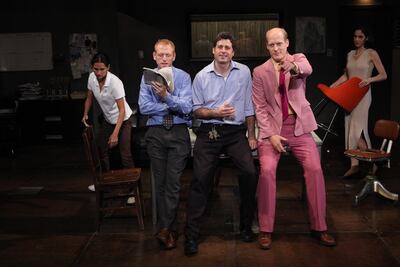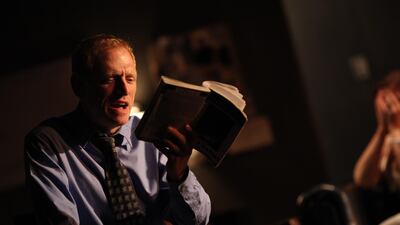Gatz is no ordinary theatre production. For a start, it is six and a half hours long, eight if you include intervals and a dinner break. Then there is the conceit itself: every single word of F Scott Fitzgerald's 1925 novel, The Great Gatsby, is read aloud on stage. That's more than 47,000 words. It really doesn't sound like a hit – and Gatz director John Collins would be the first to tell you: "We created Gatz as a kind of provocation to ourselves. I didn't have a whole lot of faith that it would work."
He could not have been more wrong. Gatz may have been conceived in 1999 as a knockabout experiment, but it has since been performed around the world, including long runs in New York and London, and was described by The New York Times in 2010 as "the most remarkable achievement in theatre, not only of this year, but also of this decade". It now arrives in the UAE for a three-night run at New York University Abu Dhabi.
So here's how it works. One morning, an office worker arrives at his desk to find that his computer won't turn on. Bored and irritated, he picks up an old copy of The Great Gatsby and begins to read, haltingly at first, but then with increasing gusto as he and his colleagues, who eventually assume the roles of the characters in the novel, are drawn into the story. "It is theatre that has wrapped itself around a novel," says Collins. "You watch what happens to someone as they become engrossed in a great book."
When we think about Fitzgerald’s novel, we tend to think of Jay Gatsby’s opulent Long Island parties, of the fast cars and the beautiful people.
But Gatz is set amid the cluttered desks and waste paper baskets of an unremarkable office. Attempting to recreate these lavish scenes would be absurd. And so, with scarcely a visual aid to help the audience, everything hangs on Fitzgerald's prose.
“There is something beautiful and distilled about the language,” says Collins. “We felt it was important not to try and replace the imagery of Fitzgerald’s words with our own imagery. You can roll a car on stage or build big, fancy backdrops but these things would diminish the language by essentially replacing it with something that could never quite live up to it.”
The low-key setting, which Collins and his team only hit upon because they began toying with the idea for Gatz in the upstairs office of a New York theatre, has another benefit. The absence of glamour, Collins believes, helps the audience better understand what Fitzgerald was really trying to say in the novel.
“In the second half of the book, the legend that Gatsby has created of himself begins to fall away and that is when you realise that this novel is all about the revelation of a truer identity,” he says. “Underneath what everyone imagines about Gatsby is his humble beginning, his lower-class status. All of that has a connection to our drab office staging. It allows us to access something more truthful.”
If, at some point while watching Gatz, you start to feel fatigue setting in, spare a thought for the actors – in particular Scott Shepherd, who plays Nick, the man who first picks up the novel. By calling him Nick, Collins is mischievously inviting us to compare him with Nick Carraway, the narrator in The Great Gatsby. But it is important to remember that in Gatz, we are watching an office worker read a novel, not an adaptation of the novel itself. It is a crucial difference.
Shepherd, who you'll see next year in Marvel's X-Men: Dark Phoenix, is on stage for every second of the play's six and a half hours. He estimates that he has performed Gatz nearly 200 times and rehearsed it at least a thousand. "It's a deep rut in my brain," he says. Shepherd once said that if you open The Great Gatsby at a random page and start reading, he can finish any passage from memory.
He compares performing Gatz to the experience of turning up at the office every day (another neat little nod to the staging). "Something about its length means that you can't adequately prepare for it," he says. "I just arrive at work with my coffee and get started. And because the play opens with the beginning of a day at the office, the fictional situation dovetails quite nicely with my actual situation."
He makes it sound so easy but Collins, who describes Shepherd as “the perfect vessel” for the novel, has seen every single performance and understands better than anyone what Shepherd brings to the role.

"He can let the novel pass through him and gracefully stay out of its way," he says. "But at the same time he's a great guide for the audience. He has a way of being very much on their side."
Fortunately, the action on stage allows Shepherd a few, brief moments of respite. There is a coffee in the opening quarter, a spot of lunch, in the form of a PowerBar, at the halfway point and then a well-earned cigarette after the second interval. "Each part is marked by a little refreshment, markers that get me through to the next phase,"
he says.
Speaking to Shepherd, though, it quickly becomes apparent that performing Gatz isn’t the draining endurance test you might imagine. It is physically demanding, certainly, but Shepherd finds Fitzgerald’s words so galvanising, he always finishes the play bouncing off the walls, rather than crumpled in a heap.
“The end of the novel is so amazing,” he says. “And as the book is coming to a close, the audience starts to feel the cumulative effect of all the time they have put in as well. The sense of gratitude in the room is just tremendous.
"Those moments [at the end of Gatz] are some of the most charged I've ever had on stage and I probably won't experience anything like it again. The material I have to deliver is some of the best material available and it's just a great feeling. When I get into the dressing room, I'm always like, 'Guys, let's go out.' And then we get to the bar, I have one beer and I collapse."
The interesting thing about a theatrical experiment like Gatz is that it simply wouldn't work with most novels. This is partly down to length – The Great Gatsby is relatively short. But there is something else about it, too, which lends itself to performance. Shepherd, who is perhaps as intimate with the novel as anyone on the planet, says it has a "seductive quality that not all books have".
"Some books make you fight upstream and want you to struggle," he says. "But with The Great Gatsby, it's downstream all the way in terms of the pleasures of every sentence and the great humour with which it plays out."
The Great Gatsby also has something to say to our own age and perhaps this is why Gatz has proven to be such an enduring hit. Fitzgerald's novel is all about the ways in which we create manufactured identities for ourselves. With the rise of social media, this is more prevalent than ever.
“It’s something that you can watch happening in microcosm all the time now,” says Collins. “Gatz is an opportunity to reflect on our sense of what is true.”
Gatz will be performed at NYU Abu Dhabi on September 21, 22 and 24
_____________________
Read more:
Why Lucinda Childs's Dance only gains in meaning as time goes on
Dubai Opera announces new season of shows: here are 6 to see
Theresa May and 5 other politicians who can't dance
_____________________


